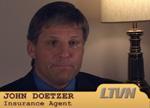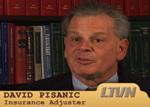Plan for an Accident?
DAVID PISANIC: At the accident scene they might say it is my fault and I am sorry. The next day they will say it is your fault and you should be sorry.
JOHN DOETZER: Everybody is very apologetic, some people are quicker to accept liability than others they then have time to think about it.
DAVID PISANIC: For hours after an accident occurs people will change their stories totally.
JOHN DOETZER: If reported to their insurance company, their insurance claims adjuster reads it a different way and initially denies liability.
DAVID PISANIC: So it is extremely important even though the accident just happened to make sure that you look around to see if any body else saw it and try to get names and phone numbers. Because more often than not people will stop at the scene, they will make sure everybody is okay, they will see what happened and they will leave and no one knows who they are and that person is often times the key to deciding who is at fault in the accident.
Call the police. Often times the police will not come out because there is no one injured and the cars are drivable. That is the normal routine in many states. But if you can get the police out there it is much to your advantage. For one thing you are never really sure that the person who is giving the information is actually the person. You are not really sure if they have insurance coverage. When the police come there is a whole air of credibility occurring and security happens because now the policeman have seen how the vehicles are positioned where the skid marks were. The policeman is going to make their recommendation as to who is at fault, you want all of that information.
Take pictures have a camera in your car. Be ready to photograph not only what happened, where it happened, marks on the road. Photograph the other person who was involved. people who were involved in the accident. If they are walking around the accident scene or doing something crazy take a picture of them. If you do not do that then you have no witnesses. Even though the other guy might have totally been at fault, you are going to end up in a situation where you can not prove he was at fault. You will pay for his damages and you will pay for your damages and be very frustrated about it because you were not protecting yourself after the accident occurred.
TIPS FOR ACCIDENTAL TRIPS
- Note the time and location of the accident
- Obtain names, addresses and phone numbers of witnesses
- Get the names, addresses and phone numbers of those injured
- Secure information about all other vehicles involved in the accident, including license plate numbers, vehicle makes, models and colors, driver's and vehicle owner's names and contact information
- Get the other persons' insurance information, preferably from their insurance ID cards
- Get passengers' names, addresses and phone numbers
- Obtain name and badge number of investigating law enforcement official and any citation information
- For your protection, make no comment or statement about the accident except to law enforcement officials or an identified representative of your insurance company
- Make a sketch of the accident scene showing names of streets or highways and the positions of vehicles involved
- Report the accident promptly to your insurance agent or company, providing as much information as you can to assist the carrier in processing your claim or in preparing for claims of others



